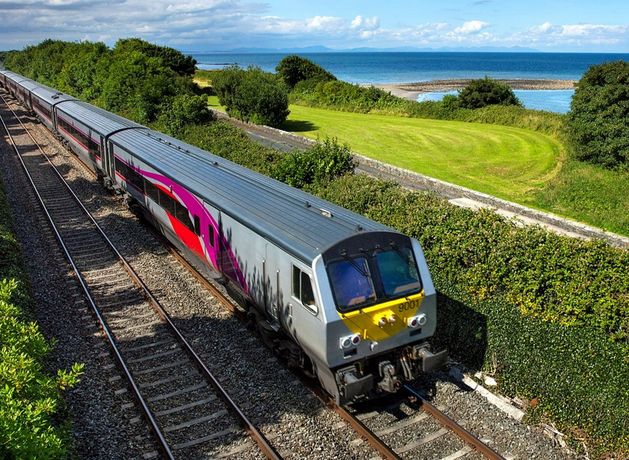Irish Rail’s plans suffer blow over judicial review and battery problems delaying roll out of hybrid trains
Swiss manufacturer Stadler was set to be named as the winner in the procurement process but runner up Construcciones y Auxiliar de Ferrocarriles (CAF) is now seeking a judicial review at the High Court.
The legal move by the Spanish manufacturer is the latest setback to major plans for expansion that Irish Rail has over the coming years.
Last week, Irish Rail’s new chief executive Mary Considine told the Joint Oireachtas Committee on Transport that battery problems will substantially delay the introduction of new hybrid trains for its planned northern Dart extension – which will run on the same line into Dublin city as the new Enterprise fleet.
The new train fleet will knock up to 20 minutes off the journey
Both projects are central to Irish Rail’s plans to go from just over 50 million journeys a year today to 180 million journeys.
The Enterprise fleet contract is for an initial eight new hybrid electric/diesel train sets, up to a maximum 200 metres in length, to operate the hourly service that was introduced last October between Dublin and Belfast.
The new train fleet will knock up to 20 minutes off the journey and tie in with further electrification of the line.
The existing Enterprise four-train rail fleet will come to the end of its standard design life in 2027. Considine told the Oireachtas Committee that delivery of the new Enterprise fleet – the contract for which was expected to be signed by the end of this year – was on track for delivery from 2029.

Irish Rail’s new chief executive Mary Considine. Photo: Arthur Ellis Photography
“The two companies have issued notifications regarding the outcome of the Enterprise Train Fleet procurement process,” said a spokesman for Irish Rail. “A challenge has been received by a bidder and this is being addressed by organisations through the legal process.”
He said that Irish Rail and Translink – under which Northern Ireland Railways operates – had selected a preferred supplier for the replacement of the Enterprise fleet “with a new generation of modern, sustainable trains, following a robust and competitive procurement process”.
The “transformational programme” was being progressed in readiness for an application for funding approval to the Governments of Ireland and Northern Ireland, alongside the Special EU Programmes Body through the PEACEPLUS Programme. That application is to be submitted imminently, said the spokesman, and would bring funding of €165m for the project under the PEACEPLUS cross-border EU programme.
During testing, a similar battery did not pass the required tests
Any delays to the Enterprise fleet will only add to headaches that Irish Rail is facing on the line north of Dublin’s Connolly station.
The introduction of the new timetable caused months of major problems for commuter services that share the line in the Dublin region. Irish Rail had been targeting the introduction of the first of the new Dart+ trains into service for the end of 2026 on the Northern commuter line.
The first new battery-electric trains of the 37 needed for this service have been delivered by manufacturer Alstom for that service and a testing and commissioning process is under way.
But during testing for an Australian tram project, a similar battery did not pass the required tests and needed some redesign, forcing Alstom to redesign the Dart+ battery, likely delaying delivery until the second quarter of 2027. Originally, the new trains were expected to begin service early next year.

